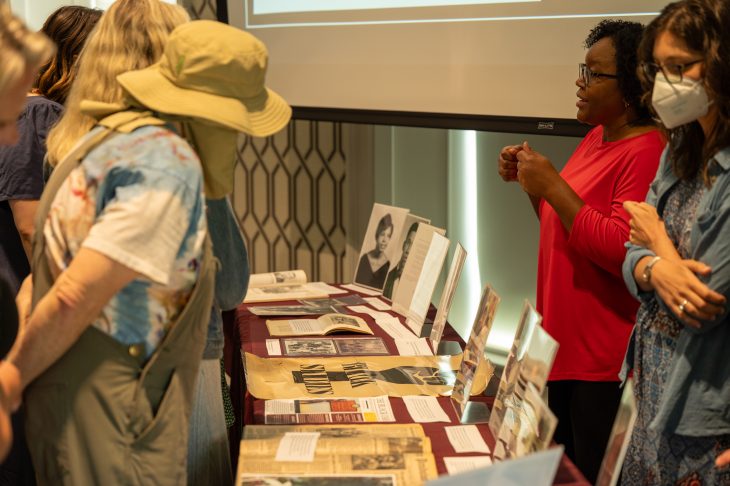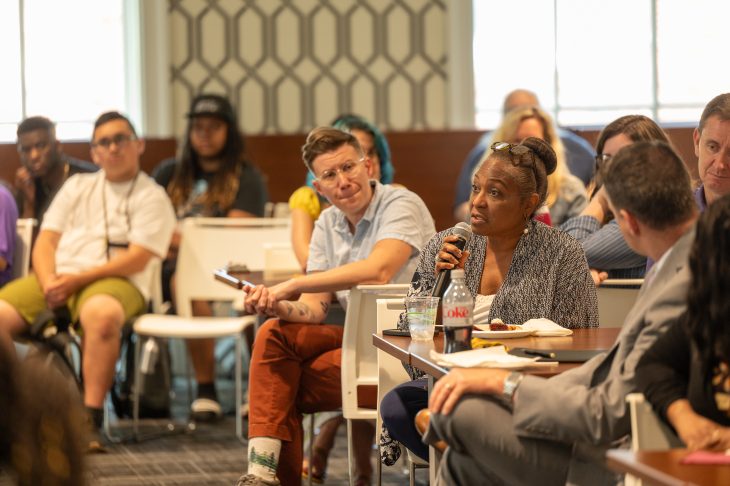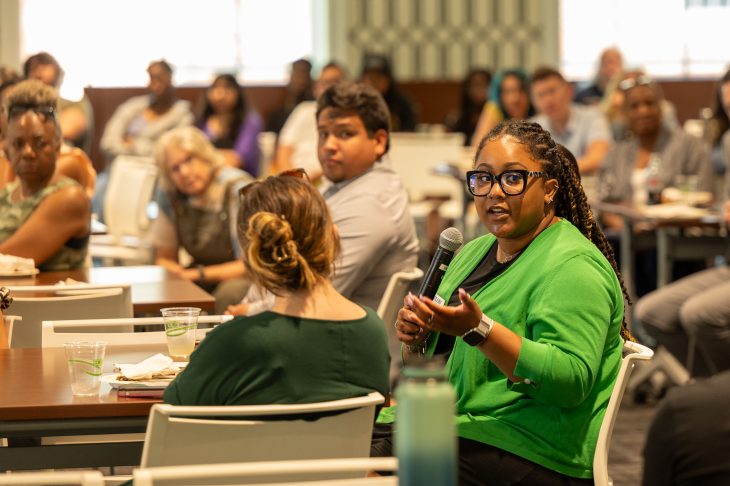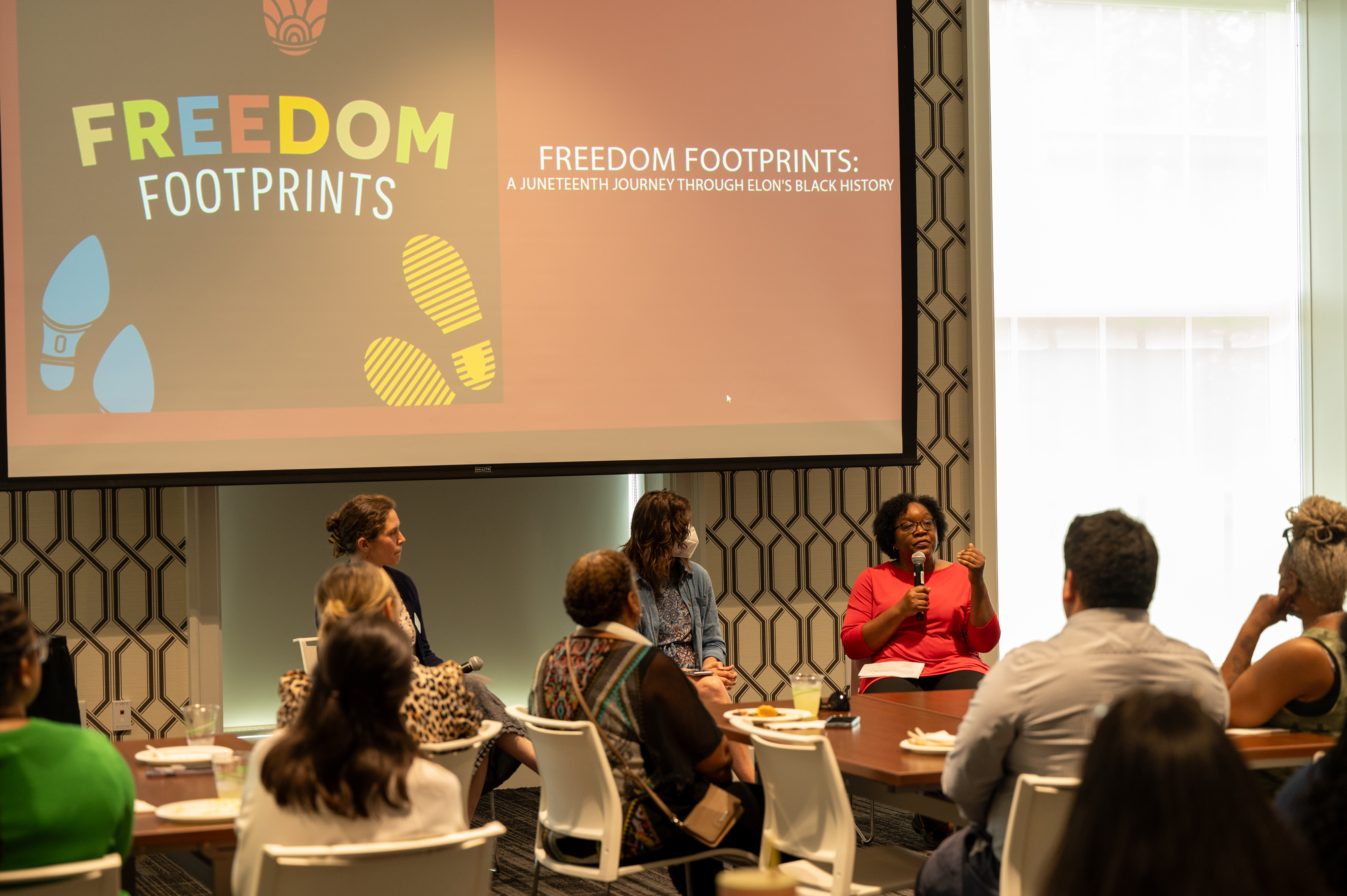Elon commemorated Juneteenth with a luncheon, Q&A, pop-up exhibit and an in-person or online journey of Black history and achievements at the university.
Elon celebrated Juneteenth on Wednesday with various events throughout the day including a luncheon, panel discussion and a pop-up exhibit in LaRose Student Commons. Members of the university community were invited to participate in a self-guided campus tour.
The Juneteenth event in LaRose Student Commons opened with words from Carla Fullwood, director of inclusive excellence education and development. “This day reminds us to commit ourselves to fostering an inclusive and equitable academic community for students, faculty and staff,” Fullwood said.
Fullwood shared a brief history of Juneteenth and thoughts about how members of the campus community could commemorate the holiday, which marks the end of slavery in the United States. “As a university we have a unique opportunity to commemorate this federal holiday with reflection and education while we are on campus,” Fullwood said.

Following Fullwood’s welcome was a panel discussion featuring Assistant Librarian Shaunta Alvarez and Assistant Professor Amanda Kleintop, with Kelly Policelli, coordinator of university archives & special collections and assistant librarian, serving as moderator. Policelli offered insights into the recent development of courses at the university that incorporate and highlight the findings within the 2020 report by the Committee on Elon History and Memory. The courses aim to empower students to explore how Elon’s history connects to the present, Policelli said.
Alvarez is the digital collections and systems librarian Elon and she served as the principal investigator for Elon’s contributions to the Locating Slaveries Legacies database. An assistant professor of history, Kleintop focuses her research on topics including digital archival practices to reparative archival descriptions to appraisal and reappraisal of archival context.
Policelli noted that Juneteenth has roots in American history with the announcement of General Order Number Three on June 19, 1865, in Galveston, Texas, which informed the people of Texas that all enslaved people were now free. Policelli asked Kleintop to expand upon Juneteenth’s history and significance. Kleintop noted in her response that the origins of what we now call Juneteenth actually stretch back further than 1865. “Juneteenth arguably has origins from 1830 with the first of August celebrations that people across the African diaspora celebrated the abolition of slavery in England,” Kleintop said.
Alvarez responded to questions relating to the Locating Slavery’s Legacies project, explaining that the initiative was launched by The University of the South in Sewanee, Tennessee. “They decided to focus their project on American universities where there are memorials to the Civil War or to the Confederacy,” Alvarez said.

Once the panel discussion concluded, the room was open for questions and comments. Members of the audience offered their thoughts about work that is still to be done, such as addressing the legacy of slavery more directly through anti-racist work. Others noted that the Juneteenth holiday should be used for reflection and learning, while others discussed a deeper examination of what freedom and emancipation mean in the modern context. Members of the audience were also encouraged to provide ideas about how they can make change.
In her closing, Fullwood introduced the self-guided walking tour and encouraged participants to take part. “Walking is symbolic to the liberation of Black and African American people in various ways,” Fullwood said. “So, I encourage you to actually take part in walking to visit the different sites on our campus.”

Elon members and community members were encouraged to engage in a self-guided walking tour on campus or review site information online. There were signs at six major stops on the tour in the heart of campus. The signs introduced the stopping point and a QR code that took people to a web page with all the information about the stopping point and the entire tour. The tour allows participants to learn some of the lesser-known histories of the Black community at Elon to commemorate Juneteenth.
“As a newer employee, this was a great way to learn about the history of Elon through the Black experience,” said C. Rizleris, assistant director of marketing communications for graduate programs. “Thank you to everyone who helped put this together to celebrate and acknowledge Black students, staff and faculty throughout Elon history.”
This commemoration event was sponsored by the Black Lumen Project, Elon University Archives and Special Collections, Committee on Elon’s History and Memory, and the Office of Inclusive Excellence Education and Development.



